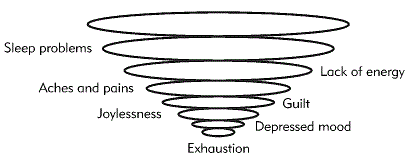Growing up, I was pretty much in a constant state of stress, although I didn’t realise it at the time. With mental wellness education lacking in our school curriculum, there’s no doubt that sadly thousands of young people are in the same situation.
This saddens me a great deal, because the more we experience stress, the more sensitive to stress we become. Stress makes a part of our brain that generates the stress response—the amygdala—more sensitive over time. This turns into a vicious cycle where the more we experience stress, the more prone we are to it.
This is what makes stress-awareness the #1 mental wellness skill for dealing with stress.
Stress-awareness has two key elements:
1) Awareness of our signs;
2) Awareness of our triggers.
As the old adage goes, “if you listen to your body when it whispers, you won’t have to hear it scream.”
When we become more aware of our signs and triggers, we can take quicker and more effective action to help ourselves feel better. We develop stress resilience.
Most of us have more awareness of our triggers than we do our signs. When we’re stressed, we’re often so fixated on what’s causing our distress, and not on how it’s impacting us. This can lead to rising stress levels that creep up on us in slow and insidious ways. As Mandy Stevens explains in an article in The Guardian,
Despite 30 years’ experience as a registered mental health nurse I didn’t recognise, acknowledge or even notice the range of symptoms I had been experiencing, or how they had been affecting me. It was only when I finally cried at work that I realised something was wrong.
The longer our stress continues, the more serious our symptoms can become. This leads to a nasty feedback loop: the more stressed we are, the worse our symptoms get, and the worse our symptoms get, the more they stress us out on top of everything else. If we don’t break the cycle, we increase our risk of developing serious issues such as depression, burnout and heart disease.
Breaking the cycle by developing our stress-awareness requires a commitment to self-reflection. It requires us to pause, to tune into our bodies, and to become more mindful of our emotions and behaviour. Only then do we develop the skill of detecting and preventing rising stress levels.
A starting point is to understand what the common signs of stress are so that we know what to look out for in ourselves. Saying this, we’re all so different. When we trigger our body’s threat stress response, we produce stress chemicals such as cortisol. When they’re released on an ongoing basis, they begin to affect our gastrointestinal, neurological, hormonal, immune, cardiovascular and musculoskeletal systems. This is what gives rise to the great variety of distressing symptoms we experience.
Here’s an overview of the common signs of stress:
Physical Signs
Breathing Difficulties
My first sign is increased heart rate, followed by not being able to catch my breath and/or breathing shallow. With practice this becomes something I can return and control with moderate effort – @coffee_hikes
When we’re stressed, we often develop breathing difficulties. This can be in the form of shallow breathing (breathing in too quickly), or over-breathing (breathing in more air as we feel like we’re not getting enough, for example through yawning or sighing frequently).
Breathing difficulties are actually the root cause of the most common physical symptoms associated with stress. When we have breathing difficulties, we lower the amount of carbon dioxide that’s normally in our blood. Although it often feels like we can’t get enough air, we’re actually getting too much! This is what leads to the wide range of symptoms including:
- Chest tightness,
- Shortness of breath,
- Heart pounding and racing,
- Heart palpitations,
- Butterflies in the stomach,
- Sweating or hot flushes,
- Tingling or numbness in the arms, fingers, toes, or around the mouth,
- Feeling dizzy and light-headed,
- Weakness,
- Feeling sick,
- Feelings of unreality.
I tremble and sweat or even get a sensation in my chest like I’ve been kicked –@wellnessnwander
Weird little jumps in my chest/stomach are my main one…a bit like when you go over a hill quickly in a car! Also tight muscles and tension all over. Definite signs that I need to take a little time to sort myself out – @rldvly
I feel my heart racing and I can’t breathe right. My hands are cold yet clams and sweaty. I feel like my face is hot. My stomach feels tight and all I wanna do is leave wherever or whatever is causing my anxiety – @ _chiquiiisss_
A quick way to test our breathing is:
- Put one hand on your chest, and one on your belly.
- Breathe for a few seconds. Which hand rises?
- If it’s your chest, you might have developed a habit of shallow breathing.
If we notice our breath has shortened or quickened, we can practise slow, deep breathing to help us feel more relaxed.
Muscle Tension and Headaches
In the threat stress response, our body reacts in a way that’s an attempt to protect us from physical danger. Muscle tension is a reflex reaction, the body’s way of protecting us from injury and pain. The thing is, the threat stress response is designed for short-term crises—it’s not a system designed to be used on an ongoing basis. Chronic stress causes the muscles in the body to be in a more or less constant state of tension. When muscles are tense for long periods of time, it can lead to general aches and pains. Both tension-type headache and migraine headache are associated with chronic muscle tension in the area of the shoulders, neck and head. Our jaw is another common area we hold tension, which can lead to us grinding our teeth.
Mine goes straight to migraine! Which is amazing as I don’t normally feel “stressed” at the time it’s just my body’s way of telling me I’m on overload! Then I tune in meditate and work out what I’m feeling overwhelmed with normally write it down after and work on ways to manage it – @citypsychchick
Next time you feel stressed, try tuning into your body to release tension. I remember the first time I practised a body scan meditation and noticed how tense my shoulders were—it was a real eye opener for me! Now, I regularly tune into my body and when I notice my shoulders are tense, I make an effort to relax them.
Sleep Problems and Fatigue
When I’m stressed I definitely feel way more exhausted and lethargic – @therapytelaviv
Professor Marie Åsberg, an expert on burnout, has put forward the ‘Exhaustion Funnel’ to describe how ongoing stress can spiral down into depression and exhaustion.

As stress levels increase, sleep and energy levels decrease. The narrowing area of the circles represents the narrowing of life as we give up the things that we enjoy but seem ‘optional’. The result is that we stop doing activities that would nourish us, leaving only work or other sources of stress that deplete our energy.
This goes hand in hand with the problematic mentality that self-care is self-indulgent; if our lives lack nourishing activities and rest, we risk spiralling down the exhaustion funnel. This happened to Mandy Stevens, who I mentioned at the start of the article:
Depression sucked the life and soul out of me. Within a week of admission I was almost unable to function at all, wringing my hands in despair and almost constantly crying. I lost all interest in myself and in my personal hygiene. I didn’t care about anything.
Digestive Issues
When we’re stressed, digestion is suppressed. In our stressed state, our body essentially diverts resources from long-term projects—like building a strong immune system, digesting food, or making babies—in favour of short-term crises—like boosting our energy, focus and attention (which would have helped protect us from predators a million years ago).
In chronic stress, the ongoing trade off of resources can result in irritable bowel syndrome (IBS)—one of the most common physical manifestations of stress. IBS can cause symptoms like stomach cramps, bloating, constipation and diarrhoea. Other digestive issues include indigestion, heartburn, and acid reflux.
Gut health = mental health for me… so when my stomach is acting up (digestion issues, Candida, Crohn’s disease) so does my mood… depression anxiety … currently it’s depression and blood sugar as well – @kat_herine_
Under heavy stress/ pressure: I got an upset tummy – at that point the msg is clear I need to take a step back and recentre/reground –@fiorenza_rossini
A study by Elisabet Johannesson and colleagues looked at 102 people aged 18-65 with IBS. Half the group were told to increase their exercise levels (being advised to do moderate to vigorous exercise for 20 to 30 minutes three to five times a week) and the other half were told to maintain their usual lifestyle. They found that after just three months, the exercise group showed a symptom improvement with an average reduction of 51 points, whereas the group with the unchanged lifestyle had an average reduction of just 5 points.
Yup, exercise is incredibly powerful! I describe the multitude of benefits and the science behind it in my book The Framework.
When it comes to managing IBS, it’s also important to avoid foods that you know will trigger an upset stomach. For many, this can include spicy foods, caffeine and dairy. Keeping a food diary or using an app such as Bowelle (iTunes link) or mySymptoms Food Diary (Google Play link) can help you identify trigger foods.
Emotional Signs
The Inner Rage Monster
I loved the description of having an ‘inner rage monster’ from @a_journey_to_wellness_!
This really is the perfect way to describe my stressed, emotional state growing up. I was super irritable, impatient, and snapped at people easily. And I cried. A LOT!
You see, when we experience high levels of stress, all our negative emotions intensify. We might feel:
- Irritable,
- Impatient,
- Tense,
- Anger,
- A sense of dread,
- Afraid,
- Worried,
- Low mood,
- Uninterest in life,
- Like we’ve lost our sense of humour,
- Lonely,
- Guilt,
- Paranoia.
It’s also incredibly common to feel our thoughts racing, which can make it difficult to concentrate.
Many people in my community shared their experiences of emotional turmoil:
Restlessness, panic, impatient, infinite thoughts runs in mind that never calms down […] I feel like crying too sometimes and can be silent for daaaaays – @arc.turus
Chest feels tight, stomach has knots, mind is racing with a lot of thoughts I know are irrational but I’m having difficulty settling it – @theracingmind
Reducing our stress levels is therefore incredibly powerful for our emotional wellbeing, as it has the potential to help us reduce a wide range of negative emotions.
Behavioural Signs
Avoidance
As I noted in the 4 Powerful Methods to Stop Feeling Overwhelmed article, our natural instinct when we’re stressed is often to do nothing and withdraw (remember: it’s called the ‘fight, flight, or freeze’ response).
Our urge to withdraw often serves as a helpful signal that something in our lives needs to change: we need to reduce our workload, focus on one thing at a time, and narrow our attention to what we can control. More tips on that here!
Restlessness
Mine is when I start second-guessing myself or feel like I have to constantly be moving around, especially if I’m feeling super anxious inside it comes off as nervous energy – @fighting4thislife
I can definitely relate to Elizabeth’s experience of nervous energy. It’s particularly uncomfortable when it happens in bed when trying to get to sleep. It’s a very odd and highly uncomfortable feeling—like a strong urge to move and shake to release energy.
You know who actually does this? Animals!
In his book Why Zebras Don’t Get Ulcers, Robert Sapolsky describes the contrast between humans and animals in dealing with stress. When an animal is chased in the wild and makes it out alive, it literally shakes off the stress and then returns to normal. As humans, we suppress our natural instinct to shake, and unlike animals, we’re prone to overthinking and worrying about what happened, worsening our distress.
The antidote to this?
Again—exercise!
Exercise helps us release stress in the same way as shaking as it helps burn the excess adrenaline and blood sugar in our systems that contribute to feelings of restlessness.
Body Picking Habits
Nail biting, nail picking, picking at our skin, and pulling at our hair are thought to be instinctual, unconscious habits we’ve adopted from our primate ancestors.
I bite my nails without realizing it or I begin to consume food without chewing (inhaling it) I speed up and begin to lose focus. I tend to recognize the cues (nail chewing still slinks in though) now and keep warm water or tea with me. If I slowly drink the water/tea, my mind and body slow down thus allowing me to focus and get a handle on things – @highfivemotivation
Finding a replacement behaviour is key to reducing body picking habits (if you find them an issue). Like Rachelle at @highfivemotivation, you could try refocusing your attention on drinking tea whenever you notice yourself nail biting. Alternatively, you might find playing with a stress ball, fidget toy or fidget spinner helpful.
Eating Too Much or Too Little
Eating activates our body’s relaxation response, so there’s no wonder it’s called comfort eating!
On the other hand, some people stop eating as much when they’re stressed, perhaps if their stress response causes them to lose their appetite or feel sick.
Other Useful Tools for Stress-Awareness
Worksheets
I’ve designed a series of 6 worksheets, offering a structured way to help you develop awareness of your signs and triggers. There’s also a transforming and reducing stress planner worksheet so you can track what you’ve tried and tested, and note what works best for you.
It’s easy to lose sight of the progress we make on our mental wellness journeys. Using worksheets is a simple and powerful way to stop this from happening—when we review our progress, we feel proud of our efforts and motivated to continue. Click here to check them out on Etsy.
Journaling
Whilst not as guided/structured as worksheets, journaling is another great tool for self-reflection. If you think you’re stressed, it’s a good idea to keep a diary for a couple of weeks to help you reflect on your possible stress signs and triggers. Check out my favourite journals in my Oh Yay! online wellness store.
Originally published at thewellnesssociety.org


